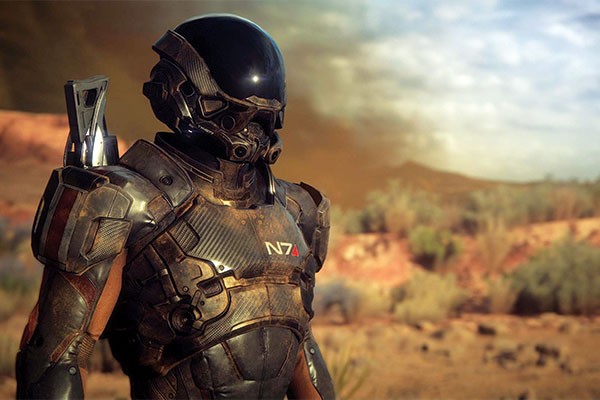Canada-based developer BioWare has leapt from strength to strength over the last couple of decades, building the beloved franchises Baldur’s Gate, Dragon Age and Mass Effect around teams of likeable, fleshed-out characters. In the process, BioWare has earned an uncommonly dedicated, diverse and often rabid fanbase. Expectations were high following what is often considered BioWare’s crowning achievement, Mass Effect 2, but to many fans its sequel was seen as something of a misstep. Promising a fresh start in a new galaxy, Mass Effect: Andromeda should have learned from BioWare’s past mistakes and embraced its successes.
But, for the most part, it did not. Instead, the title presents anticipating fans with a fist-clenching juxtaposition: on one hand we have ambitious world-building and vibrant characters, and on the other we have a plethora of bugs, long periods of waiting and poor direction. The open worlds end up feeling more daunting than wondrous, and are filled with repetitive menial side quests (think Dragon Age: Inquisition). Thankfully the ridiculously gorgeous environments that surround you take some of the punch out of being forced into your fifth round of alien sudoku.
BioWare deftly sidesteps any narrative shackles to the original trilogy’s multiple endings by centring Andromeda’s story on a group of pioneers who leave the Milky Way galaxy sometime during Mass Effect 2. You play as either Scott or Sara Ryder (with customisable appearances, of course) off to explore the Andromeda galaxy’s new worlds, cultures and mysteries along with ten thousand inhabitants of the Milky Way, spanning a handful of familiar races. During the early events of the game Ryder becomes the Pathfinder for the human race, a leader tasked with finding habitable planets and establishing outposts for your colonies.
Naturally we run into the aggressive alien cannon fodder and learn about evil aliens’ dastardly machinations through the course of the game. The story itself isn’t terribly compelling and feels more like a setup for a larger story, despite BioWare’s initial proclamations that Andromeda would be mostly self-contained, but a sense of investment really does grow on you over time. This is due almost entirely to the likability of Ryder and their crew, each with their own distinct personality, motivations and insecurities. Beyond simply dialogue options, each member of your core crew offers loyalty missions reminiscent of Mass Effect 2, giving you an option to get to know that character while embarking on a mission important to them. And, naturally, you can romance and fuck half your crew, because what would a Mass Effect game be without oral sex from a blue cat-snake-dude.
The combat itself is very reminiscent of previous Mass Effect releases, although with more malleability and simplification. Many of Ryder’s powers are similar (or identical) to those we’ve seen before, but with the addition of more depth to the class/profile system, and the ability to change between these classes on the fly to better suit your play style. Your ability to ‘boost’ short distances adds a punchy momentum to the flow of battle that can be hugely satisfying and pairs well with your (occasionally buggy) ability to take cover behind a wide range of objects while in combat. Unfortunately, battle feels hugely hampered by limiting you to a mere three equipped abilities out of a pool of a couple of dozen. While these can be swapped out at any point, it means fishing through menus to build new arrangements of abilities and class bonuses.
The weapon and armour systems suffer an even worse fate. You can find new weapons on occasion, but acquiring competent gear requires you to both research and develop these weapons and armour, all of which costs a combination of different resource currency, as well as having to craft items repeatedly to gain access to stronger gear, all through an unappealing UI. It’s as much of a shitshow as it sounds, and I ended up playing through 75% of the game with underpowered gear just to avoid the headache of it all. The Mass Effect series has always felt clunky when it comes to inventory systems, but it seems to have thrown away past lessons and stripped away control over your squad’s gear at the same time, accidentally incentivising the restrictive power system.
In the end, Mass Effect: Andromeda made some poor decisions but is an entertaining title that was released six months earlier than it should have been. Publisher EA’s money-grubbing business practices are no secret, and it seems that Andromeda suffered the all too common fate of being released unpolished and bug-ridden. To BioWare’s credit, they’ve been fairly transparent about their plans for continuous patches to fix everything from glowing stiff facial animations and overlong travel animations to rewriting poorly executed NPCs and even adding new romance options. With these changes, the game could offer a lot less friction and become a great stepping-stone for the future of Mass Effect.



